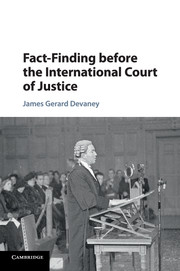Book contents
- Frontmatter
- Contents
- Table of cases
- Acknowledgements
- Introduction
- 1 Rules of evidence before the International Court of Justice
- 2 Criticisms of the Court's current reactive approach to fact-finding
- 3 The practice of other international courts and tribunals
- 4 Winds of change: the possibility of reform
- 5 A more proactive approach to fact-finding
- Epilogue
- Bibliography
- Index
3 - The practice of other international courts and tribunals
Published online by Cambridge University Press: 05 September 2016
- Frontmatter
- Contents
- Table of cases
- Acknowledgements
- Introduction
- 1 Rules of evidence before the International Court of Justice
- 2 Criticisms of the Court's current reactive approach to fact-finding
- 3 The practice of other international courts and tribunals
- 4 Winds of change: the possibility of reform
- 5 A more proactive approach to fact-finding
- Epilogue
- Bibliography
- Index
Summary
Introduction
The preceding chapter set out a number of recent criticisms of the ICJ's current reactive approach to fact-finding. It was argued that the Court's current reactive approach to fact-finding is not fit for purpose both (i) where there are abundant, particularly complex or technical facts, since the Court's reluctance to appoint experts or conduct cross-examination impede the Court in its attempts to effectively assess the evidence presented and (ii) where there is a paucity of facts, since the Court struggles to fulfil its Article 53 ICJ Statute obligation to satisfy itself the case is sound in fact and in law.
It might be said that this much is uncontroversial. As such, this chapter takes the next step and explores whether it is possible to envisage an approach that would allow the Court to conduct fact-finding more effectively. In doing so, this chapter takes advantage of the much-discussed proliferation of international courts and tribunals and draws upon the substantial body of practice in this area. The ICJ itself has ‘shown increased openness to drawing insights from other international courts and tribunals’ in recent judgments and the practice of other courts and tribunals suggests a number of procedural mechanisms that the Court could adopt in order to, in the words of Judge Donoghue in the recent Maritime Dispute (Peru v. Chile) case, ‘further enrich its practice and jurisprudence’.
By way of clarification, due to the fact that the ICJ deals exclusively with inter-State cases, the focus of Chapter 3 is likewise limited to inter-State adjudicatory bodies. Of course, various other (less exclusively State-centric) areas of international law such as investment arbitration and human rights law regularly deal with interesting and important issues relating to fact-finding. However, focusing exclusively on inter-State cases ensures the most meaningful comparisons possible. For example, it was felt that drawing conclusions from a dispute between an individual and a State, such as a case before the European Court of Human Rights, would be of dubious utility as a comparison owing to the fact that the courts seek to achieve such different goals, deal with parties of a diverse nature and apply significantly different law and procedure.
- Type
- Chapter
- Information
- Fact-Finding before the International Court of Justice , pp. 127 - 178Publisher: Cambridge University PressPrint publication year: 2016

